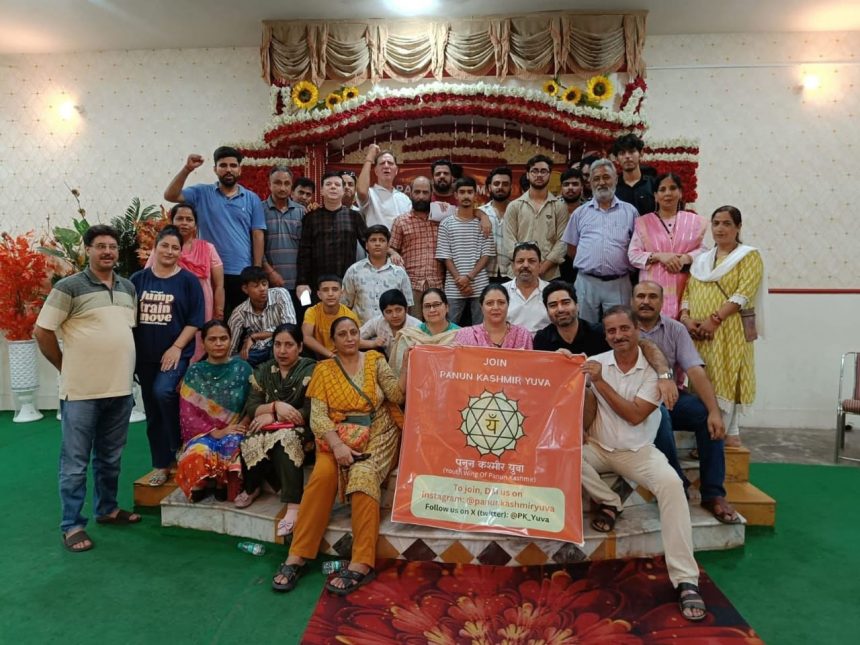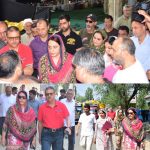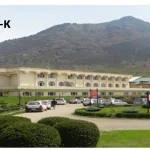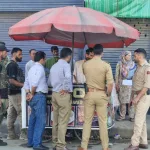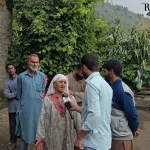Jammu, June 20: Panun Kashmir Friday organised a powerful and emotionally charged community meeting on the occasion of World Refugee Day in Jammu. The programme was hosted by B.L. Kaul, organising secretary, who opened the event by asserting that refugee status is not an identity but a reminder of the unfinished battle for justice.
He said: “Today is not a day of mourning, but of assertion, we gather not to seek pity but to remind the world of the betrayal we continue to endure.” He denounced the global silence around the “Hindu genocide in Kashmir and urged the community to consolidate its demand for rightful restitution, not symbolic gestures.”
Tito Ganju, delivered a searing address centered around the international framework of “genocide studies.” “Kashmiri Hindus are not just victims of displacement but of a systemic and prolonged genocide,” he said. Ganju warned against any attempt at forced reconciliation without justice, terming it a “second wound inflicted on an unhealed scar.”
Drawing upon international conventions, he stated that the 2005 UN Basic principles on the “Right to Remedy and Reparation prohibit enforced reconciliation without recognition of the crime and yet, that is precisely what is being attempted in the name of symbolic return and political adjustment. “We are caught in the deadly triad of genocide, denial of genocide and now, the consolidation of genocide. The perpetrators are being mainstreamed, and the victims are being told to forget,” he said. Ganju categorically rejected the call for moment of silence, stating, “Our silence has been weaponized for 35 years, today, we speak, we name and we indict.”
Bhushan Lal Bhat, senior community leader and prominent voice in Panun Kashmir, reminded the gathering of the foundational commitment that Panun Kashmir was built upon — justice, not compromise. “We are not refugees in search of food and shelter, we are a civilization denied its homeland. This is not exile but an erasure,” he said. Referring to international justice mechanisms, he highlighted that recognition of genocide is not just about memory, but about survival. “The Indian State has failed to acknowledge the Hindu genocide. The world is not just watching silently, it is complicit through its indifference.” He demanded an international tribunal and a sovereign homeland in Kashmir for the victims.
Dr. Ajay Chrungoo, Chairman of Panun Kashmir, delivered a hard-hitting speech tracing the continuity of genocide from 1986 Anantnag riots to the 2025 realities. He invoked the chilling memory of the Pahalgam massacre, warning that it was not an isolated act of terrorism but a state-facilitated pogrom, designed to reinforce Hindu extermination. “The massacre at Pahalgam is part of the same uninterrupted genocidal campaign. The victims of Kashmir are now being asked to vote in exile, cohabit with perpetrators, and stay silent for peace. This is nothing but the political consolidation of our genocide,” he said. The guest of honour, Dr. S.P. Vaid, former Director General of J&K Police, shared firsthand insights into Operation Sindoor, recalling the grim intelligence leading up to and after the Pahalgam massacre. “The threats were real, the targets were known, yet the system failed. Why? Because there was no political will to protect the Pandits,” he said. Referring to his tenure, he stated that every operation meant to safeguard Pandits was either delayed or diluted. “I witnessed how the machinery was systematically programmed to ignore red flags. Pahalgam wasn’t a failure of intelligence. It was a failure of intent,” he said.


